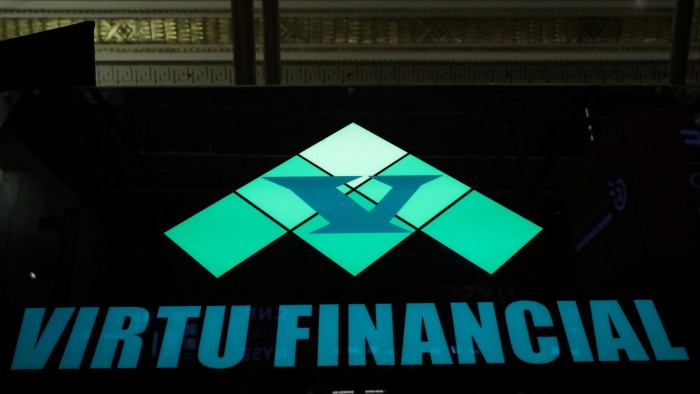Unlock the Editor’s Digest for free
Roula Khalaf, Editor of the FT, selects her favourite stories in this weekly newsletter.
Virtu Financial has come out against rival Citadel Securities’ attempts to block the opening of a new US options exchange, as the high-speed trading giant wades into a dispute over market structure that has sucked in some of Wall Street’s biggest names.
The disagreement hinges on the implementation of a 350-microsecond so-called “speed bump” that US exchange operator IEX — made famous by the Michael Lewis’s bestseller Flash Boys — hopes will protect traders on its proposed exchange from buying and selling options at stale prices.
This mechanism will allow IEX to cancel and reprice a small proportion of orders, but critics of the plan, including billionaire Ken Griffin’s Citadel Securities, say it would end up harming ordinary investors while enriching IEX’s shareholders and market makers.
New York-headquartered Virtu on Wednesday wrote to the Securities and Exchange Commission in support of IEX, which says it wants to shield investors from the cost of latency arbitrage — the exploitation by high-frequency traders of the microseconds it takes prices to reflect broader market moves.
Virtu’s intervention comes three weeks after Citadel Securities criticised what it described as IEX’s “nefarious” and “unlawful” plan “to introduce an unprecedented quote cancelling scheme” into the ballooning US options market, in a letter to the SEC.
Retail broker Charles Schwab, the New York Stock Exchange and Nasdaq have also said that IEX’s plan to launch a new equity options exchange should not be approved.
But in its letter, Virtu said IEX’s proposal “represents a well-intentioned effort to advance” market transparency and improve “the investor experience”.
It added: “The introduction of new trading venues has the potential to promote competition, foster innovation and possibly deliver better trading outcomes for all market participants.” Virtu was co-founded by Doug Cifu and Vincent Viola, former chair of the New York Mercantile Exchange and the owner of ice hockey team the Florida Panthers.
Citadel Securities and IEX have clashed before. In 2015, Citadel Securities sought to block IEX’s application for registration as a national securities exchange, writing at the time that a new entrant would “create confusion for the marketplace, and for retail investors in particular”.
Citadel’s attempt was ultimately unsuccessful, although 11 years later IEX remains a small player in US equities, with a market share of roughly 2.6 per cent, according to the firm.
Citadel’s latest attempt to shut down IEX’s planned move into the options market has drawn the ire of pressure group We The Investors, which wrote to the SEC on the subject earlier this month.
“Almost 10 years since the first comment letters were filed against the IEX Equities exchange application, and all we have are the same tired, recycled arguments,” said WTI chief technology office Dave Lauer in the letter.
“It has become clear that despite critics’ attempts to rewrite history and pretend that there is no such thing as latency arbitrage, such arbitrage does exist, and exploits both geographical and technological latencies in order to earn profits for the fastest traders to the detriment of slower traders,” he added.
John Ramsay, chief market policy officer at IEX, said: “For the people who complain that the quotes will be inaccessible, it’s worth asking inaccessible to whom and for what purpose. If the answer is they’ll be inaccessible to people who are using latency arbitrage, that is exactly the point.”
Additional reporting by Jennifer Hughes
https://www.ft.com/content/15295fd0-7f9b-4a7e-bc41-67fb35147fc6


